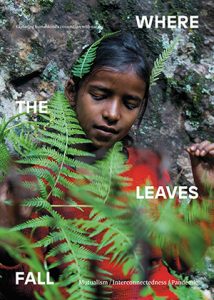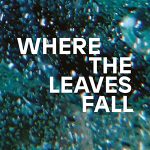Where the Leaves Fall #4: Mutualism, Interconnectedness, Pandemic

Publisher: Where the Leaves Fall
Series Number: 4
Print Length: 136 pages
Genre: Magazine
Area: Dubai, India, Himalaya, Domiz Refugee Camp, Iraq, Colombia, Mexico, Philippines, Sierra Leone, The United Kingdom (UK), The United States of America (USA), Trinidad and Tobago, Russia
Topic: Interconnectedness, Pandemic, Lived Experience, Agriculture, Climate Change, Ecology & Climate, Environmental Justice, Communal Garden, Community, Food, Collaboration & Participation, Culture & Society, Colonialism & Post-Colonialism, Poverty, Refugees & Forced Migration, Camps, Philosophy, Science, Security, Human Rights, Social Justice, Art & Design, Photography, Humanity, Hope
A MUTUAL FEELING
The issue opens with a look at how our lives are inextricably entangled with the lives of other species, and the way that artists and creatives are attempting to recognise this. We examine the legacy of George Washington Carver, the black son of a slave owner, whose insights into soil preservation and crop diversification in 19th century America preempted the concerns of modern regenerative agriculture. And Brazilian chef and author Bela Gil argues that agroecology could be the key to ending climate change and food poverty.
OUR ROOTS ENTWINED
We find out how a 16th century guru living in northern India has inspired ecology lessons in contemporary Dubai, and learn about the tenets of the Bishnoi community who were eco-warriors before the term was invented. Deepti Asthana’s photographic essay explores life for teenage girls in a remote Himalayan village. And Catherine Gilon connects colonial interventions in Nilgiris, southern India, with the current threat to native species and destabilisation of the ecosystem.
A CHANCE TO REFLECT
We examine how the Covid-19 pandemic has affected food security, with an insight into how people are finding local solutions to the collapse of global supply chains, focusing on initiatives in India, the Philippines, Sierra Leone, Colombia, Mexico, Trinidad and Tobago, the US and the UK. And how the communal garden in Domiz 1, the oldest and biggest refugee camp in Iraq, has become a symbol of hope to the camp’s 32,000 inhabitants.
DIALOGUES
Writer Maia Nikitina explores the way in which the Russian myth of Baba Yaga has evolved to reflect the country’s changing relationship with nature. Ellen Miles makes the case for nature access as a human right. And Sol Polo is inspired by artist Maria Laet’s work seeking to mend the divide between humankind and the elements.
Table of Contents
A MUTUAL FEELING
Entangled Lives
Nature’s Agent
In Favour of Life
OUR ROOTS ENTWINED
A Tale of Two Girls
Nature’s Guardians
Finding God in Nature
A CHANCE TO REFLECT
An Uncomfortable Truth
My Garden My Kingdom
Resetting Global Food System
DIALOGUES
With My Hands in the Soil
Baba Yaga
Natural Health
The Metal Element of Autumn
Notes on the Limit of Our Skin

Where the Leaves Fall is a magazine exploring humankind’s connection with nature through the intersection between social justice and the environment, art, science, culture, philosophy and food.
Source: https://wheretheleavesfall.com/
More from Where the Leaves Fall in this library, click here.
